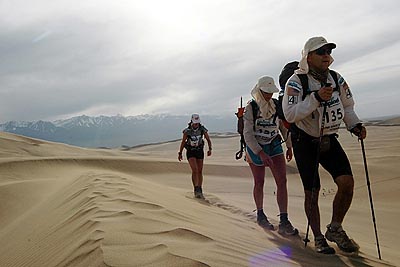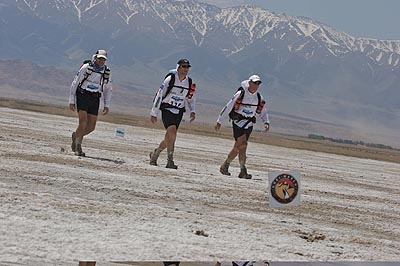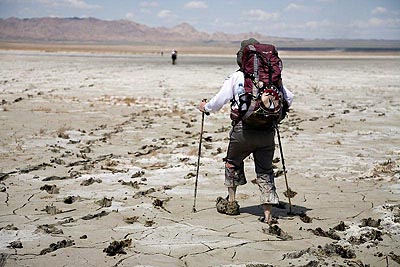|

Evening was fading into night, and after jogging five days across blistering hot dunes treacherous river crossings and mountains, Jim Chow could no longer run. Knees failing, he walked as fast as he could. There was still 30 km to go before he could rest and recharge for another day of running across China's Gobi Desert.
Chow, age 51, from Denver, was one of 172 competitors in a seven-day, six-stage, 250-km footrace across the Gobi held by an organization called RacingThePlanet last June. It was his second desert race-he had ran across the Atacama Desert in Chile the year before-but was hoping to have a more pleasant experience than he had previously. Chow had "suffered mightily" during the Chile race and had refocused his training efforts for the Gobi by running through ice and snow banks along the Rocky Mountain trails near his home.
"I was hoping the snow and ice somehow would approximate sand and rock, and surprisingly it did," Chow said.
On June 12, Chow boarded a plane with his friend and fellow runner Carl Koecher. It took them 40 hours to reach Kashgar, in China's western Xinjiang Uygur Autonomous Region. The bustling city was not what he had expected in such a remote area. The city's history as a stop on the Old Silk Road was evident by its ancient mosques and markets, but the city was surprisingly modern as well, he said.
"It completely blew me away. I thought it was going to be a dusty, old town with more goats than people," Chow said, adding that most newspaper articles and travel guides he had read had focused on Kashgar's historical districts. "Once we came into town and I saw all these big buildings I was taken aback. We did eventually go to the old town, but I was amazed at how much development was taking place."
After registration, equipment checks and breakfast, Chow and his fellow competitors boarded buses to take them into the Tashkorgan region nine hours away. They would return to Kashgar a week later, after running 250 km over some of the Earth's harshest terrain. However, the first challenge was to find a place to rest for the night, as the heaviest rains to hit the region in more than 50 years had washed away the group's pre-race campsite in flash floods.

The next morning, the runners were treated to a folk dance performance by local Tajiks in traditional costumes. RacingThePlanet donated books and sports equipment to the local school and then the race was on. Stage 1 took Chow across 36 km of valley roads and through Tajik villages. Though Chow said he had read of local unrest and tension in the region, he was amazed at the desert hospitality and friendliness.
"A lot of people wanted to take pictures with us and a lot of people had their hands outstretched. In a lot of third world countries that I've visited, outstretched hands mean 'give me something,' but here they just wanted to shake your hand," Chow recalled. "We were totally amazed. It was a real treat."
Every 10 km, Chow would rest and pick up his 1.5-liter water ration. The runners carried all of their own supplies except for the water and Chow's 30-lb pack seemed to weigh heavier with each step.
"I brought 13 packages of freeze-dried foods," Chow said, "and then I brought a whole bunch of nuts and beef jerky, jellybeans and sports jells. I brought a sleeping bag, a light jacket, socks, first aid kit and emergency equipment like whistles and mirrors."
Chow finished the stage in six hours, but Koecher had fared worse after a fall badly injured his back. Koecher, age 68, insisted he could continue, despite a muscle strain that caused him to "list 45 degrees to one side," and Chow spent a restless night making sure his friend was safe.
"That night he slept on his stomach, and the whole night I kept getting up to make sure he was still breathing. I was really worried, but he was so determined," Chow said. "You can't discourage someone like that."
Stage 2 took Chow 36 km down the Tiznap and Zerapxen rivers through Tajik settlements. After a steady six hours of running, Chow arrived at a small village where he would spend the night in a Tajik home.

"Ten of us were assigned to one family, and again it was a truly fascinating experience," Chow said. "Our host's little daughter saw a little Doberman stuffed dog that I ran with, because I train with my dog back home. I decided to give it to her and she was so happy."
Chow also traded one of his running poles for the walking stick of an old man he met along the way.
"It's those moments that I will never forget. There are all these little instances that reinforce the idea that we're all people no matter where you live and grow up. People are the same everywhere. Going through a place like this really blows away a lot of stereotypes and preconceived notions," he said.
| 